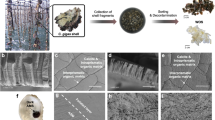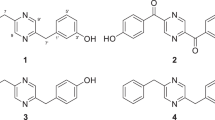Abstract
I HAVE reported the presence of echinochrome A (7-ethyl-2,3,5,6,8-pentahydroxy-1,4-naphthaquinone) in the spines of the sea urchin, Echinarachnius (Scaphechinus) mirabilis1 and Diadema setosum2. Recently it was found that the principal naphthaquinone pigment in the almost black spines of the sea urchin, Stomopneustes variolaris (Lamarck) (Japanese name, kuro-uni), which was collected at Shirahama in Wakayama Prefecture, was identical with echinochrome A. The isolation and purification of the pigment have been carried out by the identical method used in the case of Diadema setosum.
This is a preview of subscription content, access via your institution
Access options
Subscribe to this journal
Receive 51 print issues and online access
$199.00 per year
only $3.90 per issue
Buy this article
- Purchase on Springer Link
- Instant access to full article PDF
Prices may be subject to local taxes which are calculated during checkout
Similar content being viewed by others
References
Nishibori, K., Bull. Jap. Soc. Fish., 22, 708 (1957).
Nishibori, K., Nature, 184, 1234 (1959).
Author information
Authors and Affiliations
Rights and permissions
About this article
Cite this article
NISHIBORI, K. Isolation of Echinochrome A from the Spines of the Sea Urchin, Stomopneustes variolaris (Lamarck). Nature 192, 1293–1294 (1961). https://doi.org/10.1038/1921293a0
Issue Date:
DOI: https://doi.org/10.1038/1921293a0
Comments
By submitting a comment you agree to abide by our Terms and Community Guidelines. If you find something abusive or that does not comply with our terms or guidelines please flag it as inappropriate.



